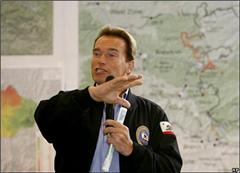|
|
California lawmakers get free gasoline
The Associated Press
By Don Thompson
Published on Friday, September 26, 2008
|
|
|
|
SACRAMENTO, Calif. — California lawmakers enjoy a perk not
available to their colleagues in any other state: unchecked use of gasoline
charge cards that stick taxpayers with the bill.
Through the first seven months of the year, California taxpayers have
spent $220,000 to pay for lawmakers’ gasoline, according to a review of
records requested by The Associated Press. That includes July, when
lawmakers already were past their deadline to approve a budget and the
state faced a $15.2 billion deficit.
California is unique in giving legislators free rein on transportation
spending, according to the National Conference of State Legislatures. In
most other states, lawmakers must submit the same kind of mileage-
expense forms used by companies to reimburse employees for their
business travel.
“You have to prove what you’re using it for,” said Morgan Cullin, a
Denver-based researcher for the bipartisan national organization.
On top of free gas, California lawmakers also get state-issued vehicles,
another perk that most states avoid.
The fuel cards given to lawmakers are supposed to be “for legislative
purposes,” but there is no way to check if they use it for public business
or private travel.
|
|
 |
|
|
|
|
|
California could save money by reimbursing
legislators for each mile they drive on
official business instead of handing them a
taxpayer-funded car and gasoline charge
card. The practice of giving legislators both
began about 50 years ago, when gas was
cheap and part-time lawmakers earned little.
Gov. Arnold Schwarzenegger doesn’t use a
state-issued gas card. As governor, his
transportation is provided by the California
Highway Patrol.
|
|
|
|
|
|
Lawmakers pull up to the pump, swipe the gas card and never see the bill, which is sent directly to legislative committees and
paid with tax dollars.
“I trust them,” said Jon Waldie, chief administrative officer for the Assembly Rules Committee.
The charge cards also can be used for incidental purchases such as snacks, drinks, windshield wipers or even oil changes.
Legislative officers said there is no way to know how much lawmakers are spending on such items, but most payments are for
fuel.
Robert Stern, president of the Center for Governmental Studies in Los Angeles, said use of the charge cards should be
scrutinized more closely or scrapped altogether.
“There should be a random audit done of the use of the car and other expenses by an outside auditor,” said Stern, the former
general counsel of the California Fair Political Practices Commission. “If everybody knows there is no oversight, they’re going
to slip a little bit.”
He said California could save money by reimbursing legislators for each mile they drive on official business instead of handing
them a taxpayer-funded car and gasoline charge card. The practice of giving legislators both began about 50 years ago, when gas
was cheap and part-time lawmakers earned little.
“Now they’re paid a lot, and they still get the perk,” Stern said.
California lawmakers make $116,208 a year plus $170 for daily expenses. The Assembly speaker and president pro tem of the
Senate make $133,639 annually.
Gov. Arnold Schwarzenegger doesn’t use a state-issued gas card. As governor, his transportation is provided by the California
Highway Patrol.
Lawmakers are on pace to set an annual record for gasoline charges, billing taxpayers nearly $40,000 more through July than
during the same seven-month period last year.
Of California’s 120 lawmakers, 21 charged more than $3,000 to their gasoline cards from January through July. Of those, 13 are
Republicans, who preached about fiscal austerity during this summer’s record-long budget impasse.
Among lawmakers who charged taxpayers more than $3,000 for their gasoline in the first seven months of the year, 13 were
Assembly members and eight were senators. The big spenders included legislators representing both rural and urban districts,
near the state capital and far away.
The biggest gas guzzler was Assemblyman Guy Houston, a Republican who charged taxpayers $5,140. Houston said he uses his
state-issued Toyota Highlander hybrid to commute 180 miles roundtrip on most days from his home in the eastern San
Francisco Bay area to Sacramento.
“I’m one of those who lives just far enough away to where it takes a lot of gas and a lot of mileage to get home, but close enough
where I get to go home and see my family,” Houston said. “In six years, I haven’t cost the state one plane flight, but I do have to
use a lot of gas.”
Some lawmakers get yet another perk. Twenty-five senators have access to a second car leased through the state Department of
General Services.
Most of the senators who use second vehicles live in Southern California or the lower Central Valley, far from the state capital.
The second car is for their use around Sacramento; the other car is typically driven within lawmakers’ home districts.
Senators fill the leased cars at state gas pumps, costing taxpayers $9,535 this year in addition to what they charged on their
individual fuel cards.
Other states reimburse lawmakers by the mile and only for specific trips.
In Florida, state lawmakers must complete forms listing each trip’s mileage, purpose, date and place the travel occurred.
Florida’s 160 lawmakers were reimbursed $197,748 through July at 44 cents per mile, which includes not only gasoline but
vehicle maintenance. That works out to $1,236 for each member, but they were using their private vehicles and not state-issued
ones as in California.
California taxpayers spent $1,874 for each of the state’s 120 lawmakers for fuel alone, or $638 more per lawmaker than Florida.
During the same period, mileage reimbursements were higher for lawmakers in three other large states — Michigan, Texas and
New York. But those payments were for lawmakers’ use of their own vehicles and covered their costs for gasoline and wear and
tear.
(source: The Trucker .com)
-fs-
|
|
|
|
|